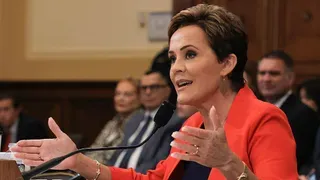June 6, 2011
GOP Tries to Bridge Social-Fiscal Divide
Kilian Melloy READ TIME: 3 MIN.
In an election season driven by economic worries, Republican leaders are trying to keep Christian conservatives excited and involved by blurring the line between religious/social issues and low-tax crusades - a divide that has helped shape past GOP primaries.
Failure to do so could potentially depress turnout by an important part of the Republican base. Not only are fiscal issues dominating the debate, but social and Christian conservatives have no obvious candidate to turn to, as they did in 2008 when Baptist minister Mike Huckabee ran.
Facing this vacuum, a host of presidential hopefuls are emphasizing their religious faith and opposition to abortion and gay marriage, even though most are better known as business-like managers of state governments and private companies.
Their efforts were on display Friday at a Washington gathering of the Faith and Freedom Coalition, a group whose name summarizes the bid to combine religious and libertarian priorities.
"I do not believe the Republican Party should focus solely on our economic life to the neglect of our human life," Jon Huntsman told the crowd of several hundred, after citing numerous anti-abortion laws he signed as Utah governor.
Acknowledging that the federal deficit will be a huge issue in 2012, Huntsman said: "If Republicans ignore life, the deficit we will face is one that is much more destructive. It will be a deficit of the heart and of the soul."
Former Massachusetts governor Mitt Romney made similar points, saying it's "a moral tragedy for us to pile up more and more debt" that is passed on to younger generations.
The Faith and Freedom Coalition is headed by Ralph Reed, who made his name as the young and savvy political strategist for the Christian Coalition in the 1990s. Building on television evangelist Pat Robertson's second-place finish in the 1988 GOP Iowa caucus, the religious right played a major role in Republican politics for years. It still does to a lesser extent.
Following the 2007 death of the politically dynamic Christian leader Jerry Falwell, some churches and ministers have de-emphasized partisan politics.
"Many pastors are self-censoring," Jim Garlow, of Renewing American Leadership, told the conference crowd Friday night.
The religious right's place is less certain now. Reed is among those trying to strengthen it by tying it more tightly to economic issues, which traditionally took a back seat to abortion, prayer in school, gay rights and other issues for a large segment of conservative voters.
Reed said the line between social conservatives and fiscal conservatives is thinner and blurrier than it was a few years ago. "The Tea Party was the moment that marriage took place," he said, alluding to the libertarian-tinged movement that arose in 2009, mainly in opposition to President Obama's health care proposals.
It's not entirely clear how solid that marriage is, however. In one of the conference's longer segments, Mark Meckler of the Tea Party Patriots acknowledged that the two groups sometimes frustrate each other. They "must stand together" to defeat Obama next year, he said.
Without question, many conservative and liberal voters care deeply about social and economic issues alike. But in the world of conservative activists, many seem more at home in one camp or the other.
An August 2010 poll by the Pew Research Center found that nearly half of tea party supporters had not heard of or did not have an opinion about "the conservative Christian movement sometimes known as the religious right."
Another conservative speaker on Friday, Tony Perkins of the Family Research Council, suggested that social issues play the principal role in the social-fiscal marriage. "We cannot fix the fiscal until we fix the family," he said, urging the government and society to encourage marriage and parental responsibility.
Anti-tax activist Grover Norquist says Christian conservatives obviously care about fiscal issues, but they still gravitate toward candidates with strong evangelical backgrounds and an emphasis on issues such as combating abortion and championing the sanctity of marriage.
Kilian Melloy serves as EDGE Media Network's Associate Arts Editor and Staff Contributor. His professional memberships include the National Lesbian & Gay Journalists Association, the Boston Online Film Critics Association, The Gay and Lesbian Entertainment Critics Association, and the Boston Theater Critics Association's Elliot Norton Awards Committee.



